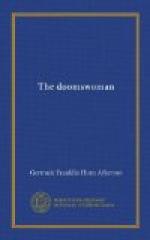“I have no intention of arguing. Words are too good to waste on such an absurd proposition that because our fathers hated, we, who are independent and intelligent beings, should not marry when every drop of heart’s blood demands its rights. As for your vow,—what is a vow? Hysterical egotism, nothing more. Were it the promise of man to man, the subject would be worth discussing. But we will settle the matter in our own way.” He took her suddenly in his arms and kissed her. She put her arms about him and clung to him, trembling, her lips pressed to his. In that supreme moment he felt not happiness, but a bitter desire to bear her out of the world into some higher sphere where the conditions of happiness might possibly exist. “On the highest pinnacle we reach,” he thought, “we are granted the tormenting and chastening glimpse of what might be, had God, when he compounded his victims, been in a generous mood and completed them.”
And she? she was a woman.
“You will resist no longer,” he said, in a few moments.
“Ay, more surely than ever, now.” Her voice was faint, but crossed by a note of terror. “In that moment I forgot my religion and my duty. And what is so sweet,—it cannot be right.”
“Do you so despise your womanhood, the most perfect thing about you?”
“Oh, let us return! I wanted to kiss you once. I meant to do that. But I should not—Let us go! Oh, I love you so! I love you so!”
He drew her closer and kissed her until her head fell forward and her body grew heavy. “I shall think and act now, for both,” he said, unsteadily, although there was no lack of decision in his voice. “You are mine. I claim you, and I shall run no further risk of losing you. Oh, you will forgive me—my love—”
Neither saw a man walking rapidly up the trail. Suddenly the man gave a bound and ran toward them. It was Reinaldo.
“Ah, I have found thee,” he cried. “Listen, Don Diego Estenega, lord of the North, American, and would-be dictator of the Californias. Two hours ago I despatched a vaquero with a circular letter to the priests of the Department of the Californias, warning them each and all to write at once to the Archbishop of Mexico, and protest that the success of your ambitions would mean the downfall of the Catholic Church in California, and telling them your schemes. Thou art mighty, O Don Diego Estenega, but thou art powerless against the enmity of the Church. They are mightier than thou, and thou wilt never rule in California. Unhand my sister! Thou shalt not have her either. Thou shalt have nothing. Wilt thou unhand her?” he cried, enraged at Estenega’s cold reception of his damnatory news. “Thou shouldst not have her if I tore thy heart from thy body.”
Estenega looked contemptuously across Chonita’s shoulder, although his heart was lead within him. “The last resource of the mean and down-trodden is revenge,” he said. “Go. To-morrow I shall horsewhip you in the court-yard of Fort Ross.”




